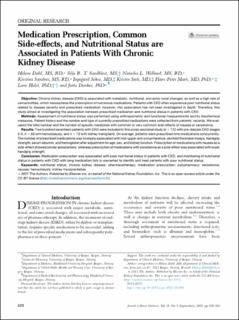Medication Prescription, Common Side-effects, and Nutritional Status are Associated in Patients With Chronic Kidney Disease
Dahl, Helene; Sandblost, Silje Regine Thue; Welland, Natasha Lervaag; Sandnes, Kristina; Sekse, Ingegjerd; Sæle, Kristin; Marti, Hans Peter; Holst, Lone; Dierkes, Jutta
Journal article, Peer reviewed
Published version

Åpne
Permanent lenke
https://hdl.handle.net/11250/3021803Utgivelsesdato
2022Metadata
Vis full innførselSamlinger
- Department of Clinical Medicine [2065]
- Registrations from Cristin [9766]
Sammendrag
Objective
Chronic kidney disease (CKD) is associated with metabolic, nutritional, and extra-renal changes, as well as a high rate of comorbidities, which necessitates the prescription of numerous medications. Patients with CKD often experience poor nutritional status related to disease severity and prescribed medication; however, this association has not been investigated in depth. Therefore, this study aimed at investigating the association between prescribed medication and nutritional status in patients with CKD.
Methods
Assessment of nutritional status was performed using anthropometric and functional measurements and by biochemical measures. Patient history and the number and type of currently prescribed medications were collected from patients’ records. We evaluated the total number and the number of specific medicines with common or very common side-effects of nausea or xerostomia.
Results
Two hundred seventeen patients with CKD were included in this cross-sectional study (n = 112 with pre-dialysis CKD stages 3-5, n = 33 with hemodialysis, and n = 72 with kidney transplant). On average, patients were prescribed nine medications concurrently. The number of prescribed medications was inversely associated with mid-upper arm circumference, skinfold thickness triceps, handgrip strength, serum albumin, and hemoglobin after adjustment for age, sex, and kidney function. Prescription of medications with nausea as a side-effect showed similar associations, whereas prescription of medications with xerostomia as a side-effect was associated with lower handgrip strength.
Conclusion
Medication prescription was associated with poor nutritional status in patients with CKD, and monitoring of nutritional status in patients with CKD with long medication lists is warranted to identify and treat patients with poor nutritional status.
